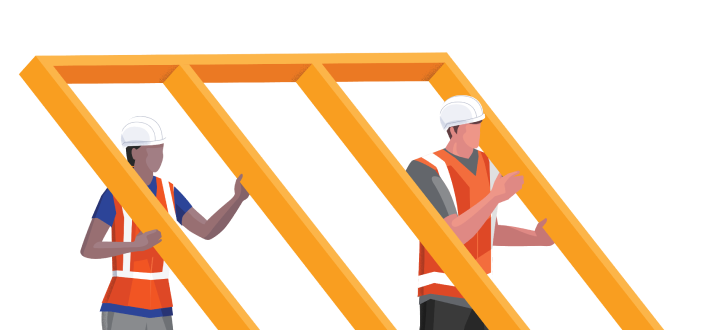— 5 min read
How to Win a Tender
Last Updated Dec 11, 2023

There is no magical tendering prescription that works for everyone. Each owner values different features of a tender: Some are all about price (although this is not very uncommon) while others value time and prioritise the quickness of job completion. Some value appearance and presentation and some select a winning tender based on your connections with subcontractors. We’ve put together some guidelines for you to keep in mind when composing your tender in order to increase your chances of winning the jobs you want.
Table of contents
Ask the right questions.
Don’t go tendering crazy. Be smart about it: Find out what types of tenders you would like to win before you even start looking at tendering on any actual jobs.
Know your ideal tenders, less-than-ideal (yet still successful) tenders, and opportunities you should avoid -- so you can spot a winning or losing tender when you see one.
Too often, contractors tender on construction jobs they are unprepared for. Think about tendering as a war—an already common analogy. You wouldn’t attack an enemy you were outnumbered by, so don’t tender on jobs outside your ability. Don’t sign your site team up for a battle they are doomed to fail. Send them into the right battle equipped with the proper skills and weaponry to come out victorious. Only tender on jobs with expectations that can be successfully met by your company, or better yet, exceeded.
Ask yourself the following questions in order to decipher whether or not a tender is right for you:
- How much profit do I need to make?
- Do I have the ability to obtain the necessary labour, materials, equipment, licences and insurance to complete this work?
- What resources do I need, including materials and labour?
- How much will these resources cost?
- How soon can I supply these resources?
- What is my timeframe for job completion?
- How flexible is my construction program? Can I accommodate any delays?
- How much of this work will be self-performing?
- How much will need to be subcontracted? How much will this cost?
Get the eBook: 6 Steps to Win More Tenders
Know your audience.
As a contractor, your clients can include homeowners, property owners, another contractor who is subcontracting work to you or public and government agencies.
Whether you deal with some or all of these types of clients, you need to conduct market research on each and develop micro strategies to appeal to each based on their personal interests, pain points and needs.
Do your homework.
Once you decide to tender on a job, do your research.
Gain knowledge about your prospects— specifically what they are looking for and what they are willing to pay to have it done.
Find out exactly what they want and align your tender to match their needs.
George Hedley, a construction busines coach and best-selling author of Get Your Business to Work, uses a fishing analogy to explain this concept. He says:
“Bid like you fish… When you go fishing and they aren’t biting, what do you do? You try different fishing techniques, change your bait or move on to another fishing hole. Like in fishing, you must change your estimating and tendering strategies to get the big ones to bite more often. You have to use the right tackle, different techniques and tastier bait to get the fish to think your bait is better than your competition, or look for better fishing holes.”
Follow directions.
Do what is asked of you. Follow instructions—exactly. Don’t skip details, roundabout questions, or paraphrase.
You may think that if you don’t include something, they can’t hold you to it. But not doing so could make you appear sloppy or as if you are trying to sneak something by. If you cannot follow directions in tender documents, the owner will question your ability to perform on the job.
Answer the questions they ask, not questions you think they might ask. If the plans don’t call for it, don’t add it. By listing out all of your qualifications, you will make things harder, not easier—decreasing your chances of winning the tender. Any extra effort on behalf of the employer to decipher your meanings leaves a lasting negative impression.
Make sure your tender contains the following in order to guarantee effortlessness on behalf of the owner.
Set yourself apart.
Find ways to differentiate yourself from your competition and demonstrate the value you can bring to your prospect better than your competition.
Give your client distinctive reasons to choose you instead of your competition by providing them with benefits they won’t find anywhere else.
If you don’t offer anything beyond what your competition offers, you can only sell your price—which is a war you don’t want to start.
First and foremost, give them what they want—not accessory features and bonuses, but things they directly ask for:
- Offer answers their problems with complete solutions rather than partial, temporary remedies + Reduce their risk
- Offer guarantees
- Provide superior customer service with personal face to face contact and prompt responses to client concerns
Sell the relationship, not the tender.
Go beyond the details and paperwork and make the effort to engage with your potential client face to face.
Make your goal to sell a long-term relationship, not a tender.
The importance of establishing a personal relationship with your potential client cannot be stressed enough. Try to meet in-person as soon and as much as possible. But if you can’t arrange personal discussions, settle for phone meetings for the time being. Use email as a last resort of communication with a potential client.
Categories:
Tags:
Written by
Brendan McGurk
10 articles
"Brendan is a Strategic Product Consultant for Procore Financials, where he enjoys leading and innovating internal company processes to deliver on both public and private projects. He brings 12 years of experience working in various construction roles ranging from builder's hand to quantity surveyor and project manager on both the owner and main contractor side.
Originally studying Accounting, he changed direction to quantity surveying after the Christchurch Earthquake in 2011. He is now qualified and an NZIQS-recognised Quantity Surveyor. He’s since worked on projects from feasibility, concept design, and value engineering right through to construction and post-construction support.
Explore more helpful resources

Workforce Scheduling in Construction: 8 Tips To Improve Labour Productivity
Proper scheduling of construction labour and resources can result in increased productivity, lower costs, and improved timelines, allowing for successful project completion. By understanding a project’s requirements, assessing the resources...
Jobsite Communication Best Practices for Head Contractors
Effective communication serves as the foundation for driving success in construction projects. From planning to execution, clear and efficient communication plays a crucial role in ensuring seamless coordination, minimising errors,...

How Cost-Plus Contracts Work in Construction
A cost-plus contract provides reimbursement for all of the costs associated with a construction project, plus a fee to account for the contractor’s overhead and profit. Construction project owners may...

Construction Insolvency: Preventive Strategies for Contractors & Builders
Construction is one of the most vulnerable industries for insolvency, and that’s during a typical economic climate. When you pile on challenges with supply chains and labour availability — in...
